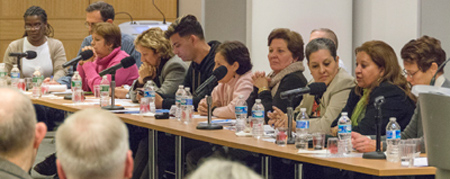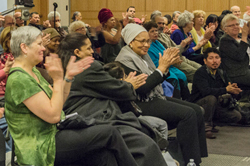

| Militant/Mike Shur |
| Members of delegation led by Federation of Cuban Women described gains for workers and women from victory of Cuban Revolution and fight against U.S. economic embargo. Panel and audience at March 14 meeting at Fordham Law School. |

Vol. 79/No. 11 March 30, 2015


| Militant/Mike Shur |
| Members of delegation led by Federation of Cuban Women described gains for workers and women from victory of Cuban Revolution and fight against U.S. economic embargo. Panel and audience at March 14 meeting at Fordham Law School. |
Amarelle, who is also a member of Cuba’s National Assembly and Council of State, headed the delegation from the FMC and other Cuban organizations to the United Nations 59th annual Commission on the Status of Women. The commission, held March 9-20, occurred in tandem with events at the U.N. involving more than 1,100 nongovernmental organizations.
Members of the Cuban delegation also took part in activities in New York and northern New Jersey that provided an opportunity for hundreds of people to learn about the living example of Cuba’s socialist revolution.
The FMC leaders spoke about the new stage in the fight against Washington’s more than half-century effort to overturn the Cuban Revolution, announced Dec. 17 at simultaneous press conferences by Cuban President Raúl Castro in Havana and U.S. President Barack Obama in Washington. The presidents each reported that three remaining members of the Cuban Five — Gerardo Hernández, Ramón Labañino and Antonio Guerrero — had returned to Cuba that day after being imprisoned in the U.S. for more than 16 years for their defense of the Cuban Revolution and that talks would open on restoring diplomatic relations, severed by the U.S. government 54 years ago.
The New York-area meetings provided the Cubans an opportunity to become more familiar with the conditions and struggles of working people here. Events included meetings in Newark, New Jersey, with students at Essex County College and with the People’s Organization for Progress; a program at a Bronx church with family members of people killed by the police who have been leading protests against cop brutality; a visit to a shelter in Brooklyn for women facing domestic violence; and a reception at City Hall with a deputy mayor and other city officials.
In addition to leaders of the FMC, the delegation included representatives of the National Union of Cuban Jurists, Women’s International Democratic Federation, Cuban United Nations Association, National Center for Sex Education, and Union of Artists and Writers of Cuba.
Gains possible because of revolution
The U.N. commission marked the 20th anniversary of the Fourth World Conference on Women, held in Beijing in 1995, and focused on steps since then to meet goals set there to advance women’s rights.
At a March 13 panel at the U.N. organized by the Cuban delegation, Yamila González Ferrer of the National Union of Cuban Jurists pointed to progress in Cuba in involving women in all aspects of social and political life. Women in Cuba today comprise 48 percent of the civilian labor force, two-thirds of technicians, and 60 percent of doctors, she said. Nearly half of National Assembly members are women. In 2003 maternity leave was extended to allow either parent to take off up to a year at 60 percent of their income.
These gains, reported by delegation members throughout their visit, “would not be possible without the Cuban Revolution,” FMC General Secretary Amarelle told the Fordham meeting.
‘Respect our sovereignty’
At all the events, the Cuban leaders discussed the talks now underway between Washington and Havana.
Cuba welcomes the talks, but “demands respect for our sovereignty and our social programs,” Ana Milagro Martínez of the Cuban United Nations Association, told the People’s Organization for Progress March 12. “We won’t allow any power to interfere in our domestic situation.”
She invited the audience to “join us in the struggle against the blockade” — the economic, political and travel restrictions that Washington has maintained against Cuba for more than five decades — and said that “Cuba must be taken off the U.S. list of state sponsors of terrorism.”
Washington has made “a change in tactics but the goal is the same,” to destroy the Cuban Revolution, Isabel Moya, director of the FMC publishing house Editorial Mujer, said at the Fordham meeting.
Since the 19th century the U.S. rulers have “viewed Cuba as their backyard, intervening when Cuba won independence from Spain” and ever since, Moya said. “Up to this day they maintain a naval base at Guantánamo, against the express wishes of the Cuban people. We’re in the process of re-establishing diplomatic relations, but real normalization is much further away.”
The fact that Washington has to negotiate today “is a victory of the Cuban people,” she added.
Some 150 people attended the March 14 public meeting, sponsored by the July 26th Coalition, Casa de las Americas and Fordham Law School chapter of the National Lawyers Guild. Eight members of the Cuban delegation took part.
A participant asked about stepped-up U.S. threats against Venezuela. “Dialogue between U.S. and Cuba won’t affect in the slightest the relations of solidarity we have with the Venezuelan government and people,” said Maritzel González of the FMC’s international relations department. She pointed to a recent Cuban government statement denouncing U.S. sanctions against Caracas. “Our principles are not for sale, our revolution is not negotiable.”
“The Cuban Revolution has a vocation of internationalism,” said Yanira Kúper, head of the FMC international relations department, in response to a question about Cuba’s role in the fight against Ebola. “A reinforcement contingent went to fight Ebola” in Sierra Leone, Guinea and Liberia, she said, but there were already Cuban doctors and nurses providing care in those West African countries. Of the 30,000 Cuban medical workers in volunteer missions today, 64 percent are women, she added.
Delegation members also answered questions about efforts by the FMC, other Cuban organizations, and the revolution’s leadership to combat remaining discrimination and prejudice in Cuba based on race, sex or sexual orientation.
Exchange with cop brutality fighters
Iris Baez, a leader in the fight against police brutality in New York since her son Anthony Baez was killed in a police chokehold in 1994, read a letter to the Fordham meeting that she sent to the mothers of the Cuban Five congratulating them on their victory.
“My heart is singing,” Baez wrote Dec. 17, the day Gerardo Hernández, Ramón Labañino and Antonio Guerrero returned to Cuba. “It gives me great strength and greater love to see my brothers walk free,” Baez said.
Hawa Bah, whose son was killed by the New York police two years ago, and Cynthia Howell, whose aunt died in a raid on her apartment that police later said was the wrong address, also spoke.
The next day Baez hosted a meeting at her church in the Bronx where family members of victims of cop killings joined a panel along with Maritzel González of the FMC and Ariel Hernández, first secretary of Cuba’s U.N. mission.
Bah described how her son Mohamed Bah was shot to death when she called an ambulance because he was ill and police showed up instead. Tanya Brown-Dickerson, a school bus driver from Philadelphia, said her son Brandon Tate-Brown was beaten and shot to death by cops there Dec. 15. Shelia Reid, mother of Jerame Reid, killed by police in Bridgeton, New Jersey, also spoke along with her son Sean. Their family has organized several protests since Jerame’s death in December.
Juanita Young, active in the fight since her son Malcolm Ferguson was killed in 2000, said, “I’ve been doing this for 15 years and the stories keep getting worse.” She participated along with Baez last October in an event of more than 200 demanding freedom for the Cuban Five. She welcomed the FMC delegation and said that even with the victory of the Five, “I would still like to meet their mothers.”
“While listening to these mothers I was recalling events from our history,” González responded. Before 1959, during the fight to overturn the U.S.-backed Fulgencio Batista regime, “every day people in Havana woke to find youth killed in the streets by the dictatorship. Of course the mothers couldn’t just cry. Some joined the revolutionary struggle.”
After the revolution won, the U.S. government supported counterrevolutionary acts that took many lives, she said. These attacks happened “because we wanted to determine our destiny, because we made a socialist revolution 90 miles from the United States.”
Before leaving New York, the Cuban delegation is also scheduled to speak at John Jay College and meet with the executive board of Service Employees International Union Local 1199.
Related articles:
Cuba spurned FBI bid to swap Assata Shakur for Cuban Five
Cuban 5 stand up for Venezuela at Havana event
US hands off Venezuela! No sanctions!
Front page (for this issue) | Home | Text-version home